2015-annual-report (PDF)
An annual report on the Justice and Reconciliation Project’s work in 2015.
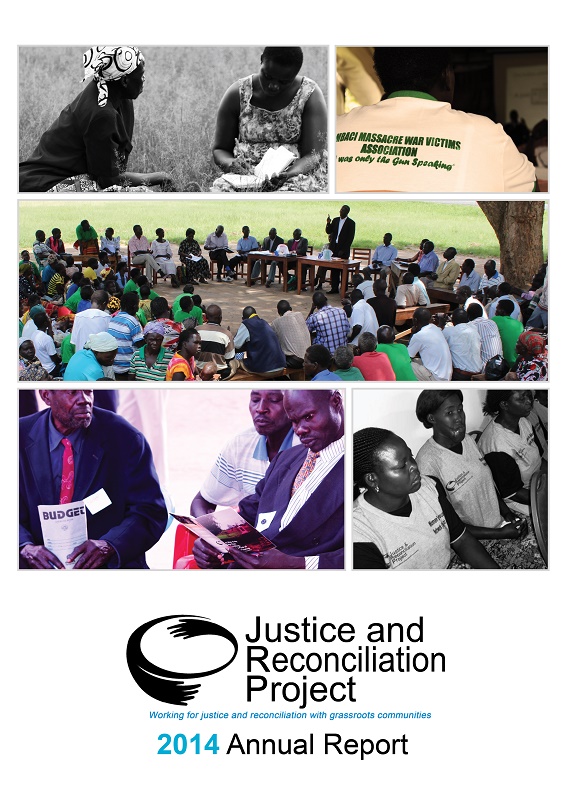

The Justice and Reconciliation Project’s 2014 Annual Report presents the organisation’s activities and their impact in 2014 under four objectives derived from JRP’s 2010-2014 five year strategic plan. Read how the memory of conflict affect communities was preserved, communities were mobilised to engage in peacebuilding processes, vulnerable groups were supported in their pursuit of justice and victim-centred transitional justice was advocated for this year.
Download: 2014 Annual Report (pdf)

Download: 2013 Annual Report (pdf)
This annual report outlines JRP’s accomplishments over the past year and highlights our commitments to bringing grassroots communities together to galvanise efforts for justice and human rights. It outlines key activities from the Community Documentation, Community Mobilization, Gender Justice and Communications departments and is a selection and general overview of our outputs and accomplishments in 2011.
To download the report, click here.
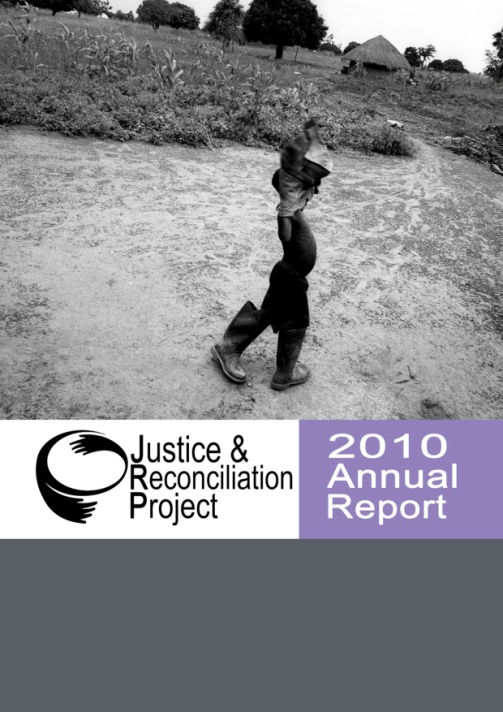

The year 2010 presented a significant step in the future of JRP following the transition from a project created in 2004 to an independent NGO with headquarters in Gulu. JRP has a national mandate to carry out transitional justice activities in Uganda. During the past year, the staff at JRP — together with our student interns, community volunteers, local victim groups and partners — made significant contributions towards the success of planned programs for the year. In particular, working in over twenty local communities in north, northeastern and West Nile regions presented us with unique insights into war-affected communities’ quests for justice, reconciliation and sustainable peace in Uganda.
Our engagements in mobilizing civil society across Acholi, Lango, Teso and West Nile sub-regions for meaningful participation in discourses on justice and reconciliation provided an opportunity for us to re-echo our commitment of ensuring that victims should be at the centre of every stage of developing any transitional justice process in Uganda.
Some key areas of our engagements in the past year include empowering victims to articulate their own positions on transitional justice, for instance the ‘Women’s Gender Justice Statement,’ which was circulated to policy-makers and to a wider audience nationally and internationally. We also mainstreamed gender-related concerns affecting young, formerly abducted mothers in most of our work with civil society, whilst ensuring that our documentation programme amplifies the voices of the young and vulnerable women in northern Uganda. In doing this, we integrated within JRP a unique documentation project, Ododo Wa: Our Stories, where several women were engaged in participatory research and training in leadership and advocacy skills. A testimony by one young woman we worked with sums it all up. She remarked, “…for long we victims of torture, rape and forced marriage have remained silent. Today we have the chance to speak on our own behalf marking an end to a long period of silence. My story has got a healing power and a testimony that many other girls went through the same suffering.”
In addition, our unique action-oriented research interventions led us into publishing important local-level based research reports such as As Long as You Live, You Will Survive on the Omot massacre providing additional insights into ‘what needs to be done’ to ensure that the justice needs of the voiceless are brought to the attention of civil society and policy-makers.
To access the report, click here.
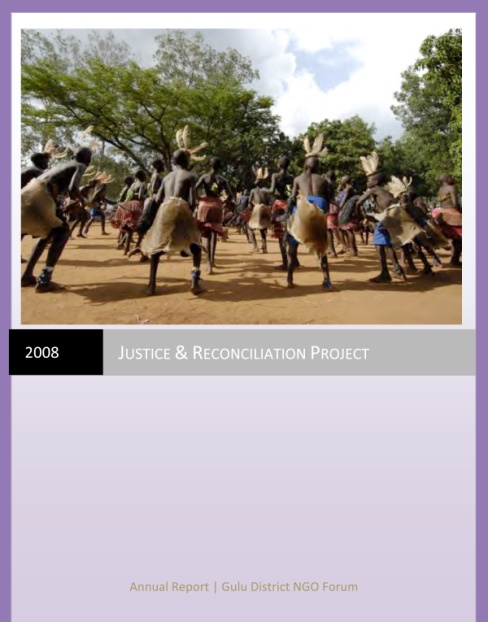

Over the past year, the Justice and Reconciliation Project (JRP) has been grateful for the opportunity to work with a number individuals affected by the war in northern Uganda, including people living in internally-displaced persons camps, youth, women and ex-combatants. JRP would like to express its appreciation to those dedicated individuals who have pursued their own stake in justice by persevering through the Juba Peace Talks, in particular the dilemma of accountability and reconciliation, not forgetting the continued persistence by war affected communities in their efforts to employ local coping mechanisms to promote peace, harmony and social coexistence.
To access the report, click here.
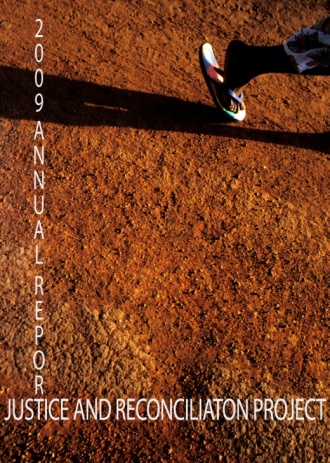

2009 was marked by a significant improvement in the humanitarian situation in northern Uganda as the region embarked on the long road to recovery from conflict. In the wake of a failed attempt to sign the Final Peace Agreement in November 2008, and the resumption of hostilities between the UPDF and the LRA marked by the launch of operation Lightening Thunder, the future of northern Uganda hung in the balance. While many across northern Uganda predicted the worst, the security situation improved substantially, allowing thousands of IDPs to return to their original homesteads while many of the displacement camps were demolished as proof of the finality of the return process. The determination to return to former homesteads and rebuild lives and villages stands as a testament to the capacity of those affected by the conflict to persevere amidst challenges such as lacking educational, health and other social services.
On the transitional justice front, the government of Uganda began to implement elements of the Juba peace protocols still considered valid despite the failure to reach a final agreement. Funds for the peace, recovery and development plan (PRDP) were availed and massive reconstruction works were launched. The government, through the Justice Law and Order Sector (JLOS) working group, also began drafting policies and a framework for the implementation of transitional justice mechanisms. Huge strides were made in setting up the War Crimes Division of the High Court, and countrywide consultations were carried out to solicit views on the domestication of the Rome Statute.
Driven by the desire to pursue justice and reconciliation in Uganda, JRP continued to monitor developments in transitional justice and contribute to policy debates through action oriented research and advocacy in 2009. JRP’s advocacy strategy was dual in nature; at the national level targeting policy makers, donors, and other government organs including the Judiciary, the Amnesty Commission and the Parliament of Uganda; while engaging with grassroots communities at the local level to improve documentation among war affected communities and empower communities to advocate for appropriate justice and reconciliation mechanisms.
JRP has done this using community based approaches, such as community dialogues, dissemination of research reports at the grassroots level, research and documentation of local level transitional initiatives and various other efforts to ensure that the views of grassroots people are included in transitional justice debates. This annual report presents a summary of all activities implemented by JRP in the year 2009. Special thanks go to our donors: the Norwegian Embassy, who made all of these achievements possible.
To access the report, click here
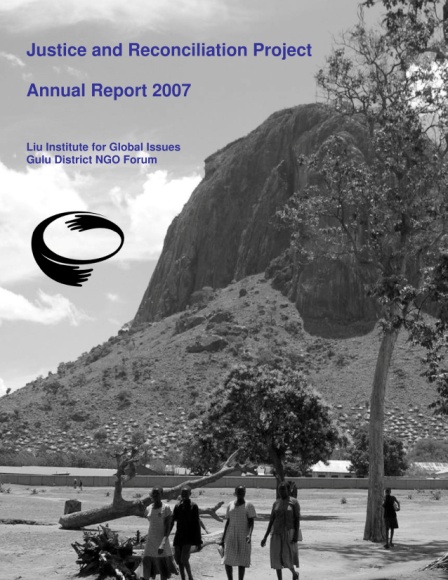

July 2007 marked the one-year anniversary of the initiation of peace talks between the Lord’s
Resistance Army (LRA) and the Government of Uganda, hosted in the southern Sudanese capital of Juba. JRP has taken an active role in bringing the concerns and demands for justice and reconciliation from the grassroots to the bargaining table. The June signing of Agenda Item Three on Accountability and Reconciliation was in part the result of weeks of JRP’s preparation of original research findings into a comprehensive presentation made to delegates. The seminar, entitled Towards a Common Understanding of Traditional, National, and International Justice Options, was co-organised by JRP with the International Center for Transitional Justice and convened Ker Kwaro Acholi on June 2 in Juba. The past year of research has uncovered a plethora of issues that must be addressed in order for lasting peace to be attained in Uganda.
From January through March, the JRP team conducted a major research phase in 9 IDP camps, examining community-level mechanisms that might facilitate a process of truth-telling at the local level in northern Uganda. The ensuing report, The Cooling of Hearts: Community Truth-Telling in Acholi-land examines the desires and fears of the war-affected populace in learning the truth about the now 21-year-old conflict. In an ongoing strategy of community consultation, this report was translated into Luo, brought back to the camps, and discussed in local papers, international forums, community dialogues, and on the radio. Consultations with local leaders were sought in order to refine the report to truly reflect the opinions of Acholi. It provides important new insights into current debates in the country and at the Juba peace talks on how justice can be served in northern Uganda.
Throughout the course of the truth-telling research, staff also uncovered a desire amongst residents that certain massacres be documented and that their consequences be discussed. JRP responded and produced Field Note 4: Remembering the Atiak Massacre of April 20, 1995, released in April. A JRP representative visited the community for the memorial ceremony; the site of one of many as-yet undocumented scars on the populace of northern Uganda. JRP continues to document other major atrocities and several similar reports are forthcoming in 2008.
A fifth Field Note entitled Abomination: Local belief systems and international justice was written by JRP in order to emphasize the need for policy-makers to understand the importance of understanding local spiritual beliefs in Acholi when considering transitional justice strategies in the region. In the spirit of previous JRP reports such as Roco Wat I Acholi (2005) and Alice’s Story (2006), this Field Note bridged the gap between indigenous and international motives for justice in Acholi.
JRP continues to lead its colleagues locally, nationally and internationally in the unification of local voices aiming to affect positive change in Juba, Garamba and Kampala. JRP was instrumental in to the release of the August 11th Lira Declaration on Agenda Item Three of the Juba Peace Talks by Cultural and Religious Leaders, Women and Youth from Madi, Teso, Lango and Acholi Sub-Regions. The Lira
Declaration is the result of a consultation attended and signed by the leadership of traditional and religious institutions, including women and youth representatives.
Project staff actively built upon their capacities as researchers and advocates throughout 2007, attending numerous workshops and presenting solutions to justice and reconciliation issues on behalf of JRP’s community partners. JRP will continue this important work in 2008 and beyond.
To access the report, click here.